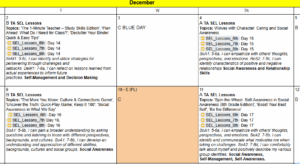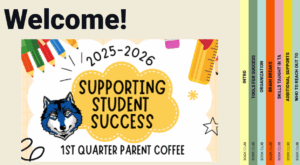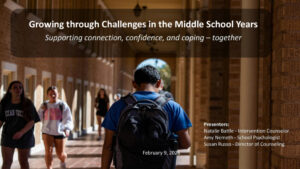Why Middle School Counselors?
Middle school students are characterized by rapid physical growth, curiosity about their world and an emerging self-identity. Through a comprehensive developmental school counseling program, counselors work as a team member with school staff, parents and the community to create a caring, supportive climate and atmosphere whereby young adolescents can achieve academic success.
Middle school counselors enhance the learning process and promote academic achievement. School counseling programs are essential for students to achieve optimal personal growth, acquire positive social skills and values, set appropriate career goals and realize full academic potential to become productive, contributing members of the world community.
The professional middle school counselor holds a master’s degree and required state certification in school counseling. Maintaining certification includes on-going professional development to stay current with education reform and challenges facing today’s students. Professional association membership is encouraged as it enhances the school counselor’s knowledge and effectiveness.
Middle School Counseling
Sensitive to the physical, social, emotional, and intellectual changes of emerging adolescents, middle school counselors work proactively and cooperatively with all students and their families to address individual needs and ensure school success.
- In addition to counseling, consulting and making referrals, they advise students on course selection and transition to high school
- Coordinate career awareness activities that may include the use of the interest inventories, worksite visits and Career Days
- Facilitate parent-team conferences
Individual Counseling
In confidential setting, students are assisted in understanding their feelings, attitudes, concerns, and behaviors. Counselors establish a relationship characterized by respect, understanding, openness, acceptance and trust.
Group Counseling
Group counseling may assist students experience commonly shared concerns and/or developmental difficulties in areas such as interpersonal relationships with peers and/or adults, school attendance, academic achievement, or coping with life changes.
Classroom Counseling Lessons
Counselors assist teachers with meaningful activities targeting the personal, social, academic, and career development of all students. Counselors will go into Health classes to present the students with information on bullying, teasing, and sexual harassment. In addition, in January and February counselors will review/create with students their 6 year plan as well as course selection for the upcoming year.
Consultation
Counselors may confer directly with teachers, parents, administration and other helping professionals to help students in the school setting. In this role, the counselor helps others to assists the student in dealing more effectively with developmental or adjustment needs.
Coordination
Counselors are responsible for the coordination of various services and activities in the school. Examples of these activities include crisis intervention programs, parent and student orientation and education programs, parenting skills courses and conflict resolution. Counselors often coordinate referrals to the school psychologist, social worker and various community agencies.
Developmental Counseling Program
The developmental counseling program in Arlington Public Schools is composed of organized objectives and activities, based upon the National Standards for School Counseling Programs. The curriculum may be presented in classrooms or advisory groups. The objectives may be integrated into subject-area curriculum.
Upcoming Social Emotional Learning Lessons in Teacher Advisory using Responsive Classroom: (click on the image to open in a new tab)

Home and School in Partnerships . . .
A positive relationship between school and home fosters the academic, social, and emotional growth of children.
School Counselors:
- Seek to involve parents in the school program
- Invite parents to review the school counseling program
- Obtain parental consent for individual or group counseling
- Protect the privacy of information shared by parents and children; and
- Inform parents of situations or behaviors that may harm their child.
*************************************************
PARENT CHAT 2-0-26: Growing Through Challenges in the Middle School Years
PARENT CHAT 9-30-25: Supporting Student Success:


**************************************************
PARENT CHAT 2-4-25: Mental Health Resources:
Mental Health Resources Presentation
Hazel Health Teletherapy Access

 Contact
Contact  Calendars
Calendars Careers
Careers Engage
Engage  District
District



